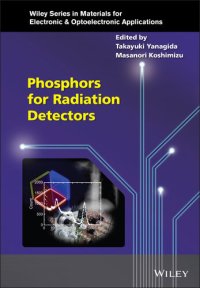
Ebook: Phosphors for Radiation Detectors
- Genre: Technique // Materials
- Series: Wiley Series in Materials for Electronic & Optoelectronic Applications
- Year: 2022
- Publisher: Wiley
- City: Hoboken
- Language: English
- epub
Phosphors for Radiation Detectors
Discover a comprehensive overview of luminescence phosphors for radiation detection
In Phosphors for Radiation Detection, accomplished researchers Takayuki Yanagida and Masanori Koshimizu deliver a state-of-the-art exploration of the use of phosphors in radiation detection. The internationally recognized contributors discuss the fundamental physics and detector functions associated with the technology with a focus on real-world applications.
The book discusses all forms of luminescence phosphors for radiation detection used in a variety of fields, including medicine, security, resource exploration, environmental monitoring, and high energy physics.
Readers will discover discussions of dosimeter materials, including thermally stimulated luminescent materials, optically stimulated luminescent materials, and radiophotoluminescence materials. The book also covers transparent ceramics and glasses and a broad range of devices used in this area.
Phosphors for Radiation Detection also includes:
- Thorough introductions to ionizing radiation induced luminescence, organic scintillators, and inorganic oxide scintillators
- Comprehensive explorations of luminescent materials, including discussions of materials synthesis and their use in gamma-ray, neutron, and charged particle detection
- Practical discussions of semiconductor scintillators, including treatments of organic-inorganic layered perovskite materials for scintillation detectors
- In-depth examinations of thermally stimulated luminescent materials, including discussions of the dosimetric properties for photons, charged particles, and neutrons
Relevant for research physicists, materials scientists, and electrical engineers, Phosphors for Radiation Detection is an also an indispensable resource for postgraduate and senior undergraduate students working in detection physics.